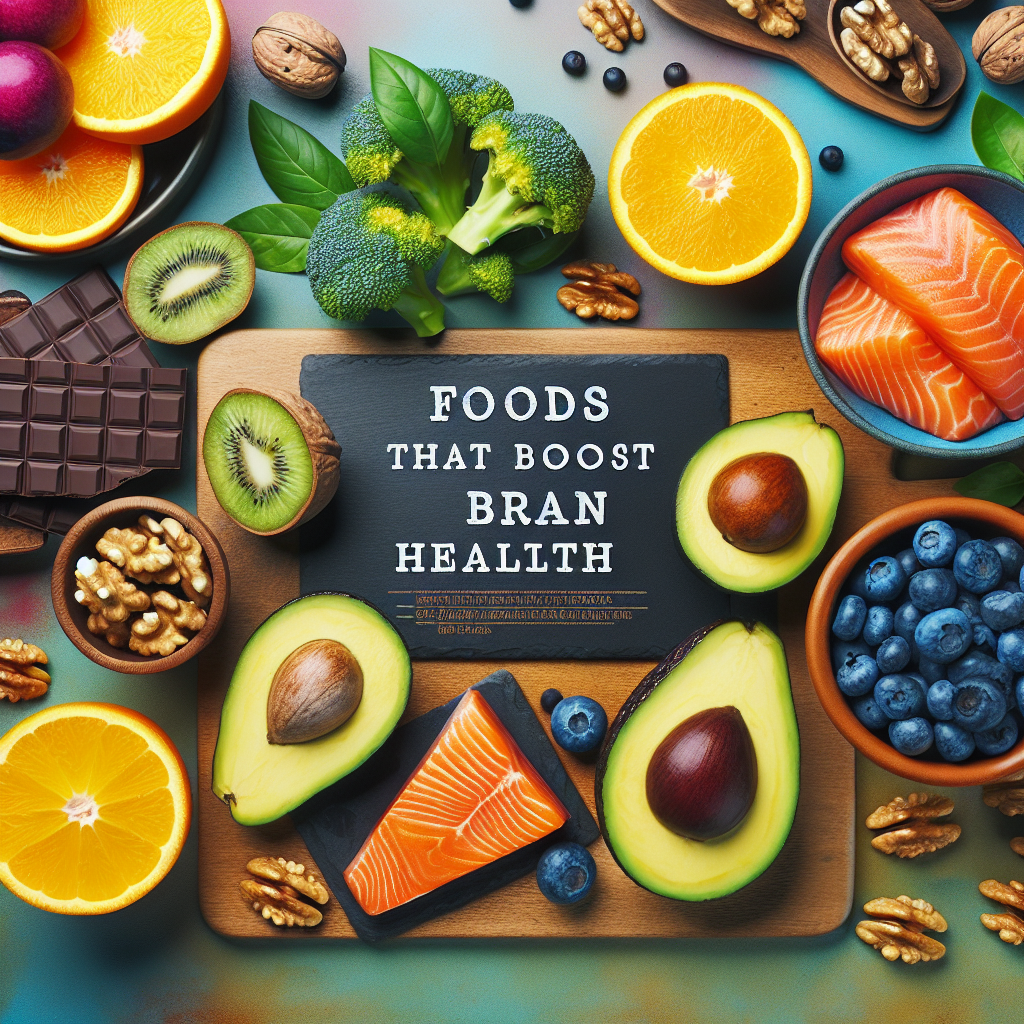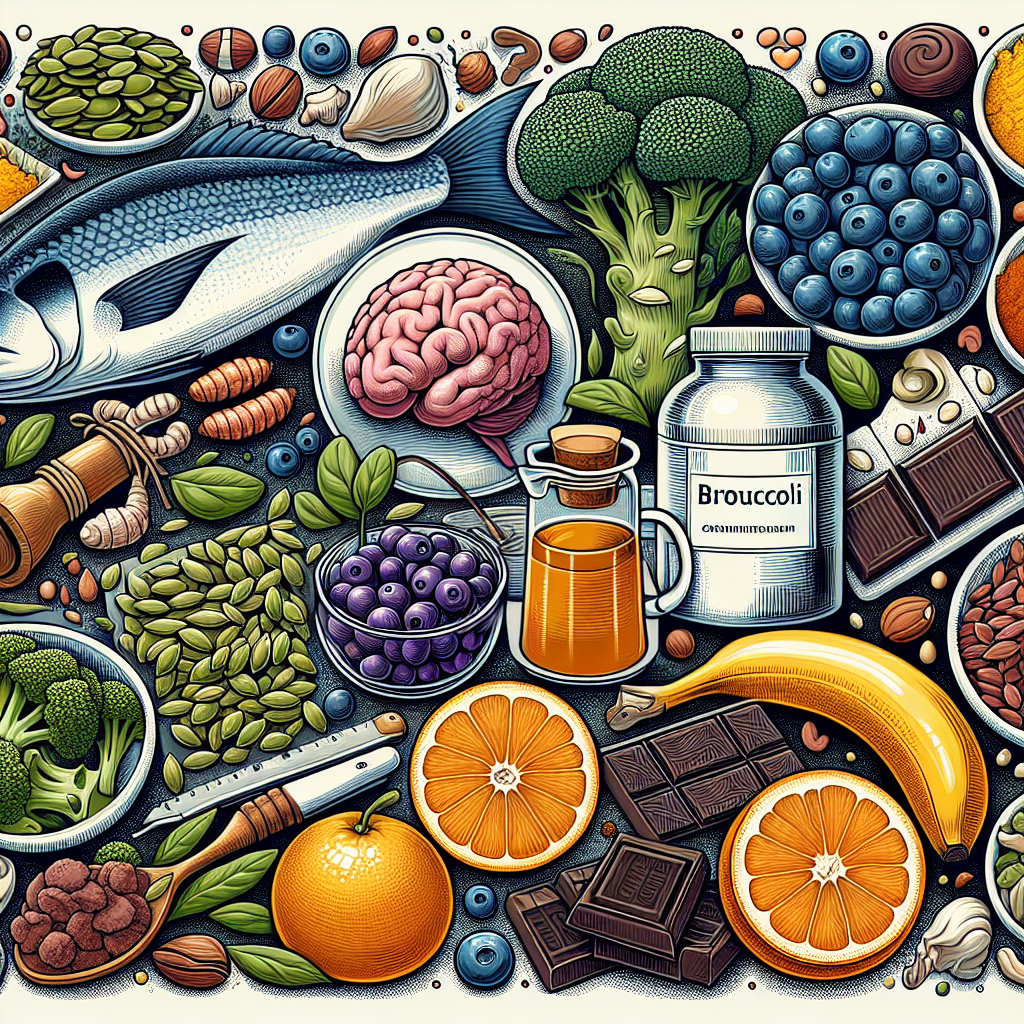Foods That Boost Brain Health

Discover the power of foods that boost brain health! Improve your cognitive function, memory, and focus today. Visit My Vibrant Vitality now to learn more.
Top 10 Foods That Enhance Brain Function and Memory
The human brain, a complex organ responsible for all our thoughts, perceptions, and actions, requires specific nutrients to function optimally. A balanced diet, rich in certain foods, can enhance brain function, improve memory, and even reduce the risk of brain-related diseases. Here are the top ten foods that can boost your brain health.
Firstly, fatty fish, such as salmon, trout, and sardines, are rich in omega-3 fatty acids, which are essential for brain health. Omega-3s are a major building block of the brain, and they are needed for learning and memory. Studies have shown that people who eat a lot of fatty fish score higher on cognitive tests and have sharper minds.
Secondly, blueberries are packed with antioxidants that delay brain aging and improve memory. These tiny fruits are also rich in flavonoids, which improve the connection between brain cells. Consequently, blueberries can enhance brain function and delay brain aging by alleviating inflammation and oxidative stress.
Thirdly, turmeric, a deep-yellow spice, has crossed over from the kitchen to the medical world due to its powerful active compound, curcumin. Curcumin can cross the blood-brain barrier and has been shown to directly enter the brain and benefit the cells there. It boosts brain-derived neurotrophic factor, a type of growth hormone that helps brain cells grow.
Fourthly, broccoli is packed with antioxidants and vitamin K, believed to support brain health. The antioxidants in broccoli can help protect the brain against damage. Additionally, its high levels of compounds called glucosinolates can slow the breakdown of the neurotransmitter, acetylcholine, which the brain needs for the central nervous system to perform properly.
Fifthly, pumpkin seeds are full of antioxidants and a rich source of magnesium, iron, zinc, and copper. These seeds contain antioxidants that protect the body and brain from free radical damage. They’re also an excellent source of magnesium, which is essential for learning and memory.
Sixthly, dark chocolate is rich in flavonoids, caffeine, and antioxidants. The flavonoids in chocolate gather in the areas of the brain that deal with learning and memory. Researchers say these compounds may enhance memory and also help
Incorporating Brain-Boosting Foods into Your Daily Diet

The human brain, a complex organ responsible for all our thoughts, perceptions, and actions, requires specific nutrients to function optimally. Incorporating brain-boosting foods into your daily diet can significantly enhance cognitive function, memory, and overall brain health.
The first group of foods that are beneficial for brain health are fatty fish. Rich in omega-3 fatty acids, fatty fish like salmon, trout, and sardines are essential for brain health. Omega-3s are a major building block of the brain, and are necessary for learning and memory. Studies have shown that people who consume more fish have sharper minds and a lower risk of mental decline.
Transitioning to another category of brain-boosting foods, we find berries. Berries are packed with antioxidants that delay brain aging and improve memory. Several studies have shown that eating berries can improve memory and cognitive function. They are also rich in flavonoids, a type of antioxidant that has been shown to improve brain health.
Next on the list are turmeric and broccoli. Turmeric has been shown to cross the blood-brain barrier, meaning it can directly enter the brain and benefit the cells there. It’s a potent antioxidant and anti-inflammatory compound that has been linked to improvements in memory, easing depression, and growing new brain cells. Broccoli, on the other hand, is packed with antioxidants and vitamin K, believed to support brain health.
Nuts and seeds are also excellent brain foods, particularly walnuts and pumpkin seeds. Walnuts have high levels of DHA, a type of Omega-3 fatty acid. Pumpkin seeds are rich in antioxidants and a rich source of magnesium, iron, zinc, and copper.
Oranges and other foods rich in vitamin C are also beneficial for brain health. Vitamin C is a key factor in preventing mental decline. Eating sufficient amounts of vitamin C-rich foods can protect against age-related mental decline and Alzheimer’s disease.
Lastly, let’s not forget about eggs and green tea. Eggs are a good source of several nutrients tied to brain health, including vitamins B6 and B12, folate, and choline. Green tea is known for its brain-boosting effects, particularly its potential to enhance brain function, improve memory, and delay brain aging.
Incorporating these brain-boosting foods into your daily diet doesn’t have to be a daunting task. Start by adding a serving of fatty fish to your meals a couple of times a week. Snack on a handful of nuts or seeds during the day, or add them to your breakfast cereal or yogurt. Include more berries in your diet, either as a snack or in your morning smoothie. Add a sprinkle of turmeric to your soups, stews, or roasted vegetables, and increase your intake of broccoli. Enjoy an orange as a snack, or squeeze fresh orange juice for breakfast. Lastly, consider replacing your morning coffee with green tea.
In conclusion, a diet rich in brain-boosting foods can significantly improve your cognitive function, memory, and overall brain health. By making small changes to your daily diet, you can provide your brain with the nutrients it needs to function optimally. Remember, a healthy brain is the cornerstone of a healthy life.
The Science Behind Foods That Improve Cognitive Health
The human brain, a complex organ responsible for all our thoughts, perceptions, and actions, requires specific nutrients to function optimally. The science behind foods that improve cognitive health is fascinating, revealing how our dietary choices can significantly impact our brain health and cognitive abilities.
To begin with, the brain is an energy-intensive organ, consuming about 20% of the body’s calories. Therefore, it needs plenty of good fuel to maintain concentration throughout the day. Glucose, derived from carbohydrates, is the primary source of energy for the brain. However, not all carbohydrates are created equal. Complex carbohydrates, such as those found in whole grains, fruits, and vegetables, release glucose slowly, helping to keep us mentally alert throughout the day. On the other hand, simple sugars found in refined foods can lead to peaks and troughs in the amount of glucose in our blood, resulting in periods of mental sluggishness.
Next, let’s consider the role of fatty acids in brain health. The brain is about 60% fat, and half of that fat is the omega-3 kind. Omega-3 fatty acids, found in abundance in fatty fish, flaxseeds, and walnuts, are essential for brain health. These fats are necessary for building brain and nerve cells, and they are crucial for learning and memory. Research has shown that people who eat diets high in Omega-3s have lower rates of depression, while other studies have shown that a lack of Omega-3s can lead to mood swings and mental decline.
Transitioning to another vital nutrient, let’s discuss antioxidants. These compounds, found in a variety of fruits and vegetables, protect the brain from oxidative stress. Oxidative stress is a destructive process that occurs when the body has an imbalance of antioxidants and free radicals, the harmful byproducts of energy production. Over time, oxidative stress can damage cells throughout the body, including brain cells, leading to cognitive decline. Foods rich in antioxidants, such as berries, turmeric, and dark chocolate, can help to combat this process, promoting brain health.
Moreover, certain vitamins and minerals play a crucial role in brain health. B vitamins, for instance, help to produce and control chemicals in the brain called neurotransmitters, which transmit signals between brain cells. Deficiencies in B vitamins, particularly B12 and B6, can lead to poor memory and cognitive decline. Iron, zinc, and iodine are also essential for brain health, contributing to normal cognitive function and nerve signaling.
Lastly, let’s not forget about the role of hydration in cognitive health. The brain is about 75% water, and even mild dehydration can cause symptoms such as brain fog, fatigue, and poor concentration. Therefore, drinking plenty of water throughout the day is essential for maintaining optimal brain function.
In conclusion, the science behind foods that improve cognitive health underscores the importance of a balanced, nutrient-rich diet for maintaining and enhancing brain function. By incorporating a variety of complex carbohydrates, omega-3 fatty acids, antioxidants, vitamins, minerals, and plenty of water into our diets, we can provide our brains with the nutrients they need to function at their best. As the saying goes, “you are what you eat,” and this is particularly true when it comes to brain health.